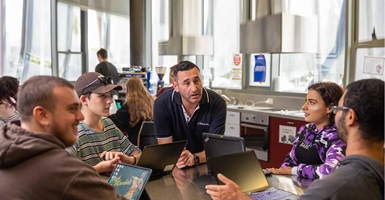Many people assume that if you want to study a degree you need to follow the traditional route and finish Year 12 before applying to study at university.
The truth is there are many ways to enrol in a bachelor’s degree, regardless of whether you just finished school last year, or you left school early to pursue a career 20 years ago.
Chisholm Senior Advisor of Student Recruitment Tania Pearce says she has seen many students leave school at the end of Year 10, then complete a certificate course at TAFE and follow a pathway to a bachelor’s degree.
If studying a degree is something you aspire to do, or need to do to achieve your career goals, you can.
Here’s how to study a degree without an ATAR:
Pathway from a TAFE course to a degree
Tania says one option is to follow a “degree pathway”, which begins with a TAFE course like a certificate or a diploma. You don’t need an ATAR, or to have finished high school, to study a TAFE course.
Once you have successfully completed a diploma course, it can lead into a related bachelor degree.
“For example, you could complete a Diploma of Community Services in one year, and continue on to the Bachelor of Psychology for two years,” Tania says.
There are other popular pathway options in many study areas including accounting, engineering, early childhood education and building design.
Pathways are popular partly because they are more cost-effective than traditional degrees – you can start working in the field earlier – and partly because of the learning outcomes. Many TAFE certificates and diplomas qualify for free or subsidised Government training initiatives, making them an affordable study option for eligible students.
“You’re working while continuing to learn, which makes you highly employable at the end. You’re a graduate with work experience in the field – the kind of ‘unicorn’ employers always hope to find,” Tania says.
Degree pathways all look a little bit different depending on what you want to do and the qualifications and experience you already have. For example, some students will need to start with a certificate, while others can start their pathway with a diploma.
Once you’ve finished a related TAFE course, some students opt for direct entry into a Chisholm bachelor or postgraduate course, while others may receive credit towards a degree at a university of their choice. Make sure to check with the university you’re applying to as credits vary depending on training providers and courses.
Use your current experience and skills to enter a degree
If you’ve already got some qualifications and career experience under your belt, it’s worth investigating whether you’re eligible for Advanced Standing.
Chisholm Higher Education Senior Project Officer Michael Watchorn says Advanced Standing can give credit for skills and knowledge you’ve acquired through your previous study, work and life experience.
“For example you may have worked in the health industry for 10 years and we would give you credit for your industry experience and give you recognition for what you’ve done in your life,” he says.
Michael says many mature age students choose to study a degree in order to gain a qualification they need to move to the next stage of their career, while others are looking for a career change or returning to the workforce after having a family.
“The benefits are that often mature age students have really clear goals and know what they want to get out of their studies and they’re often more confident and ready to focus.”
It’s never too early to plan your pathway to a degree
Michael says he encourages students to plan ahead and consider their study pathway options might look like before enrolling in their first TAFE course.
“It’s never too early to think about what your next step will be,” Michael explains. “Students can start a pathway even before they’ve finished school. For example, a VCE or VCE Vocational Major student can go on to further training at TAFE and then into higher education.”
Michael says those who follow a degree pathway at TAFE have the added benefit of gaining hands-on skills and experience along the way, not just learning the academic side of their chosen career. “In engineering the students are gaining the applied skills and the tech skills which a uni degree doesn’t offer.”
And, Michael adds, a degree at TAFE is still just as valuable as a degree studied at a university. “Our accounting, engineering and nursing degrees are all registered with the relevant regulatory bodies. The degrees are equal regardless of where you achieved it.”
With no ATAR required and direct entry available, why wait? Apply today and start your pathway to a degree or your dream career. Visit our Courses page for our full course list.


